Critical Essay: Case Management Practices in Mental Health
VerifiedAdded on 2023/03/17
|10
|3581
|33
Essay
AI Summary
This essay provides a critical analysis of case management practices within the field of mental health. It begins by defining case management and its role in helping individuals overcome stress and trauma, highlighting the characteristics and tasks involved, such as assessment, planning, implementation, and monitoring. The essay then delves into various models of case management, including Intensive Case Management, Strength-based Case Management, the Stress-Vulnerability model, and Clinical Case Management, each tailored to address specific needs and challenges. Furthermore, it explores the influence of neoliberalism and historical developments on case management, discussing the impact of privatization, funding cuts, and the evolution of care practices. The essay also examines the historical context, particularly the challenges faced by women and the importance of comprehensive mental health services. It emphasizes the benefits of case management, such as crisis stabilization, flexibility, and self-reliance, while also acknowledging its limitations, including ignoring basic psychological cases. The essay aims to provide a comprehensive overview of case management in mental health, its models, historical context, and the critical issues faced by the target population.
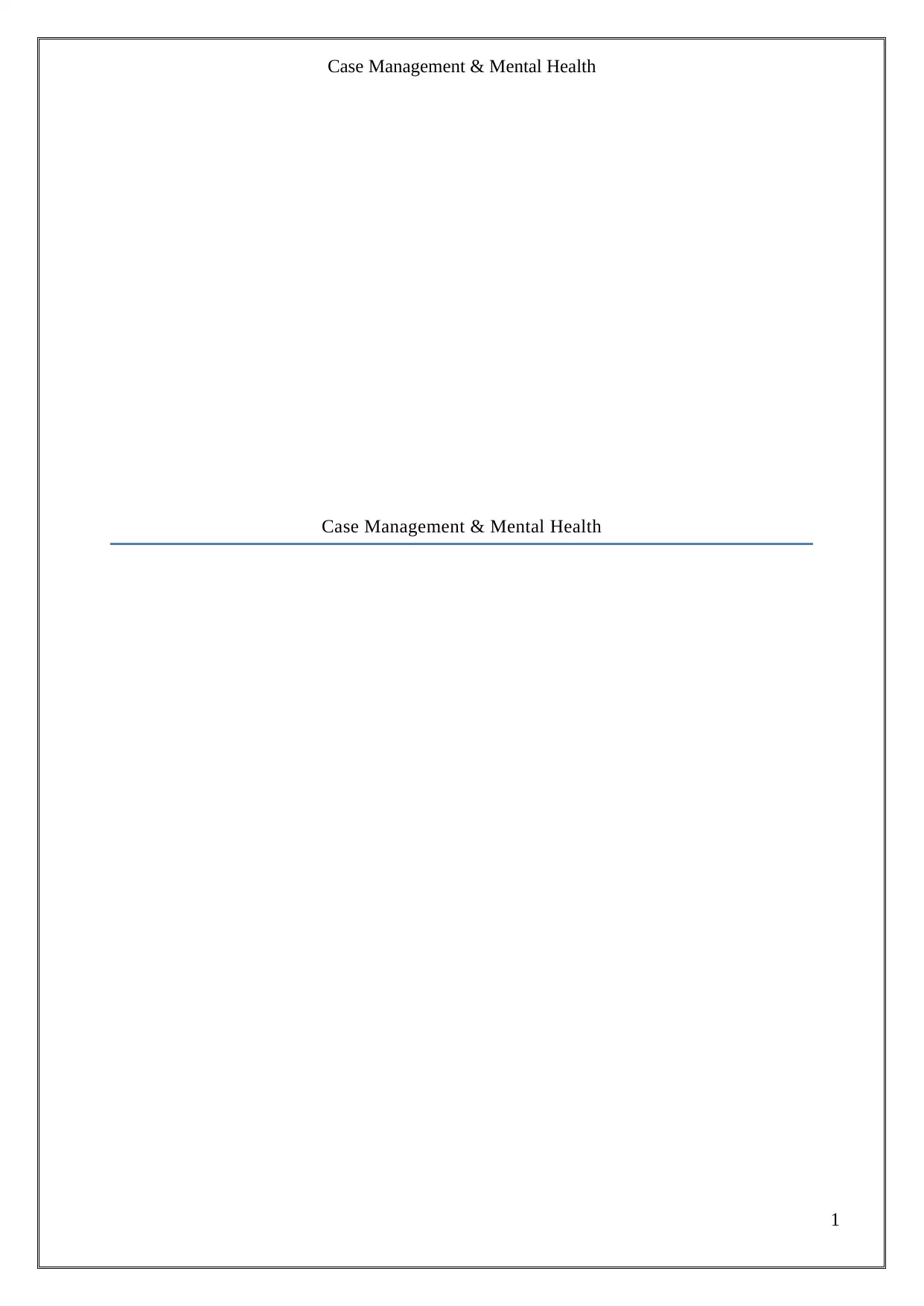
Case Management & Mental Health
Case Management & Mental Health
1
Case Management & Mental Health
1
Paraphrase This Document
Need a fresh take? Get an instant paraphrase of this document with our AI Paraphraser
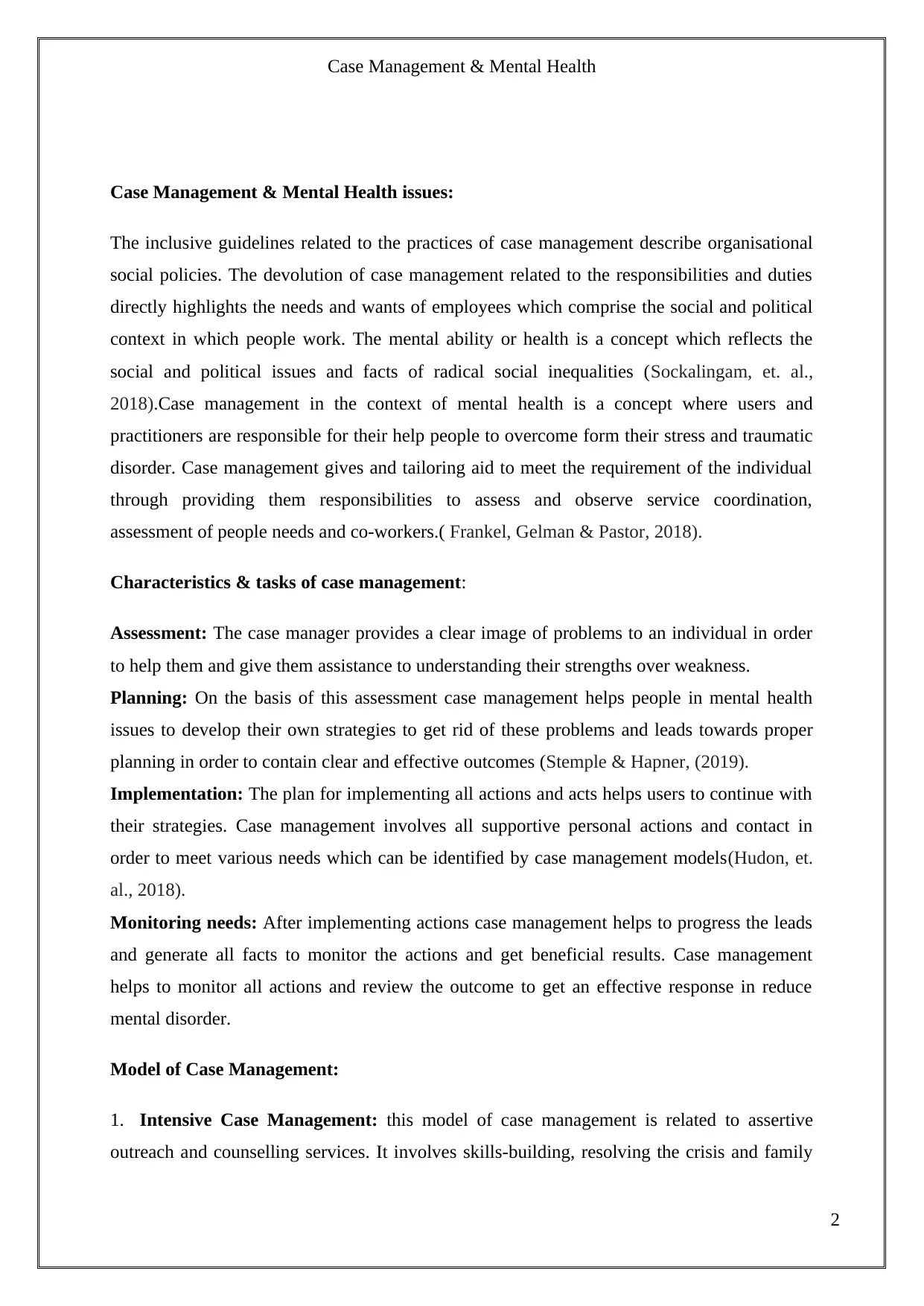
Case Management & Mental Health
Case Management & Mental Health issues:
The inclusive guidelines related to the practices of case management describe organisational
social policies. The devolution of case management related to the responsibilities and duties
directly highlights the needs and wants of employees which comprise the social and political
context in which people work. The mental ability or health is a concept which reflects the
social and political issues and facts of radical social inequalities (Sockalingam, et. al.,
2018).Case management in the context of mental health is a concept where users and
practitioners are responsible for their help people to overcome form their stress and traumatic
disorder. Case management gives and tailoring aid to meet the requirement of the individual
through providing them responsibilities to assess and observe service coordination,
assessment of people needs and co-workers.( Frankel, Gelman & Pastor, 2018).
Characteristics & tasks of case management:
Assessment: The case manager provides a clear image of problems to an individual in order
to help them and give them assistance to understanding their strengths over weakness.
Planning: On the basis of this assessment case management helps people in mental health
issues to develop their own strategies to get rid of these problems and leads towards proper
planning in order to contain clear and effective outcomes (Stemple & Hapner, (2019).
Implementation: The plan for implementing all actions and acts helps users to continue with
their strategies. Case management involves all supportive personal actions and contact in
order to meet various needs which can be identified by case management models(Hudon, et.
al., 2018).
Monitoring needs: After implementing actions case management helps to progress the leads
and generate all facts to monitor the actions and get beneficial results. Case management
helps to monitor all actions and review the outcome to get an effective response in reduce
mental disorder.
Model of Case Management:
1. Intensive Case Management: this model of case management is related to assertive
outreach and counselling services. It involves skills-building, resolving the crisis and family
2
Case Management & Mental Health issues:
The inclusive guidelines related to the practices of case management describe organisational
social policies. The devolution of case management related to the responsibilities and duties
directly highlights the needs and wants of employees which comprise the social and political
context in which people work. The mental ability or health is a concept which reflects the
social and political issues and facts of radical social inequalities (Sockalingam, et. al.,
2018).Case management in the context of mental health is a concept where users and
practitioners are responsible for their help people to overcome form their stress and traumatic
disorder. Case management gives and tailoring aid to meet the requirement of the individual
through providing them responsibilities to assess and observe service coordination,
assessment of people needs and co-workers.( Frankel, Gelman & Pastor, 2018).
Characteristics & tasks of case management:
Assessment: The case manager provides a clear image of problems to an individual in order
to help them and give them assistance to understanding their strengths over weakness.
Planning: On the basis of this assessment case management helps people in mental health
issues to develop their own strategies to get rid of these problems and leads towards proper
planning in order to contain clear and effective outcomes (Stemple & Hapner, (2019).
Implementation: The plan for implementing all actions and acts helps users to continue with
their strategies. Case management involves all supportive personal actions and contact in
order to meet various needs which can be identified by case management models(Hudon, et.
al., 2018).
Monitoring needs: After implementing actions case management helps to progress the leads
and generate all facts to monitor the actions and get beneficial results. Case management
helps to monitor all actions and review the outcome to get an effective response in reduce
mental disorder.
Model of Case Management:
1. Intensive Case Management: this model of case management is related to assertive
outreach and counselling services. It involves skills-building, resolving the crisis and family
2
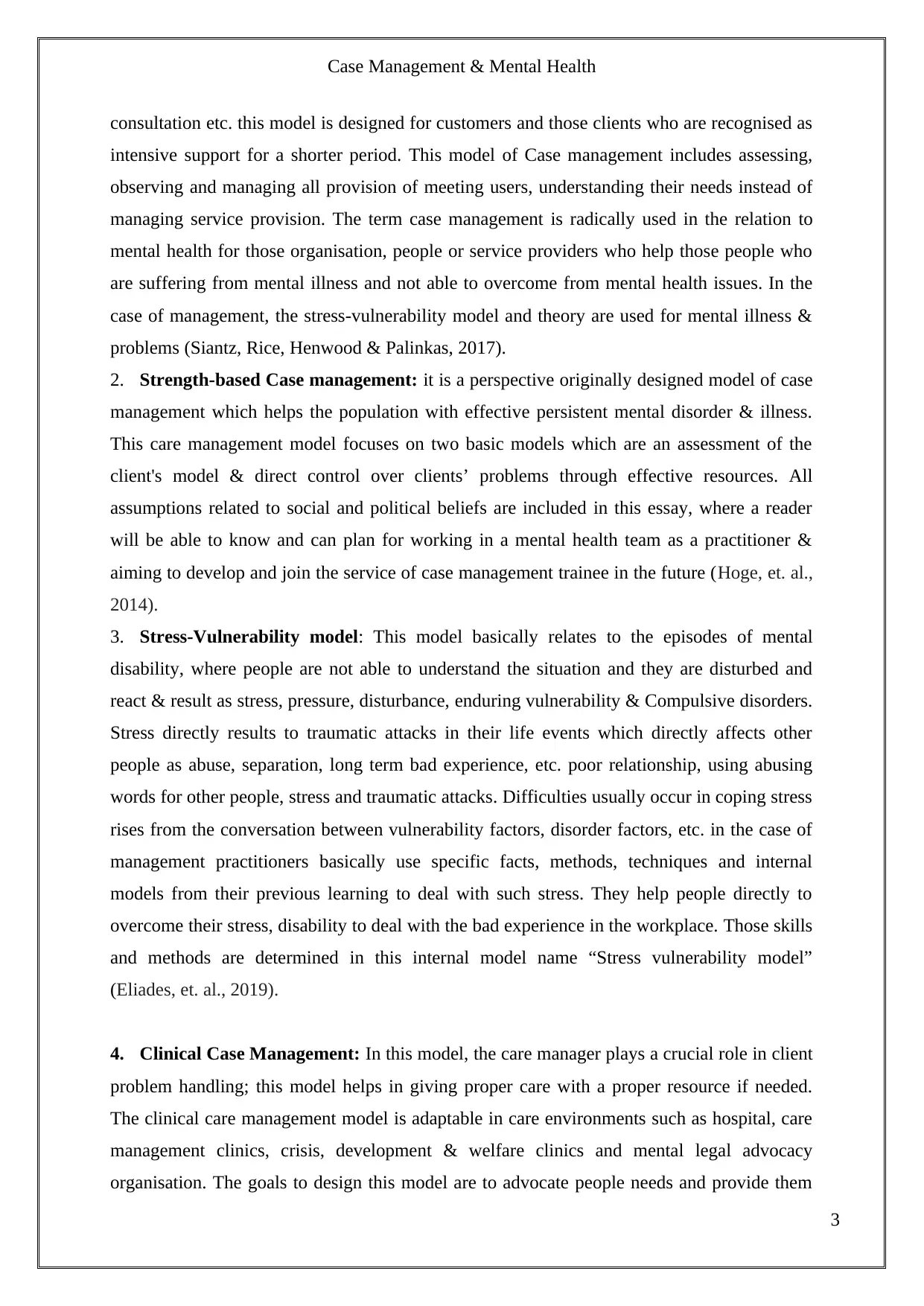
Case Management & Mental Health
consultation etc. this model is designed for customers and those clients who are recognised as
intensive support for a shorter period. This model of Case management includes assessing,
observing and managing all provision of meeting users, understanding their needs instead of
managing service provision. The term case management is radically used in the relation to
mental health for those organisation, people or service providers who help those people who
are suffering from mental illness and not able to overcome from mental health issues. In the
case of management, the stress-vulnerability model and theory are used for mental illness &
problems (Siantz, Rice, Henwood & Palinkas, 2017).
2. Strength-based Case management: it is a perspective originally designed model of case
management which helps the population with effective persistent mental disorder & illness.
This care management model focuses on two basic models which are an assessment of the
client's model & direct control over clients’ problems through effective resources. All
assumptions related to social and political beliefs are included in this essay, where a reader
will be able to know and can plan for working in a mental health team as a practitioner &
aiming to develop and join the service of case management trainee in the future (Hoge, et. al.,
2014).
3. Stress-Vulnerability model: This model basically relates to the episodes of mental
disability, where people are not able to understand the situation and they are disturbed and
react & result as stress, pressure, disturbance, enduring vulnerability & Compulsive disorders.
Stress directly results to traumatic attacks in their life events which directly affects other
people as abuse, separation, long term bad experience, etc. poor relationship, using abusing
words for other people, stress and traumatic attacks. Difficulties usually occur in coping stress
rises from the conversation between vulnerability factors, disorder factors, etc. in the case of
management practitioners basically use specific facts, methods, techniques and internal
models from their previous learning to deal with such stress. They help people directly to
overcome their stress, disability to deal with the bad experience in the workplace. Those skills
and methods are determined in this internal model name “Stress vulnerability model”
(Eliades, et. al., 2019).
4. Clinical Case Management: In this model, the care manager plays a crucial role in client
problem handling; this model helps in giving proper care with a proper resource if needed.
The clinical care management model is adaptable in care environments such as hospital, care
management clinics, crisis, development & welfare clinics and mental legal advocacy
organisation. The goals to design this model are to advocate people needs and provide them
3
consultation etc. this model is designed for customers and those clients who are recognised as
intensive support for a shorter period. This model of Case management includes assessing,
observing and managing all provision of meeting users, understanding their needs instead of
managing service provision. The term case management is radically used in the relation to
mental health for those organisation, people or service providers who help those people who
are suffering from mental illness and not able to overcome from mental health issues. In the
case of management, the stress-vulnerability model and theory are used for mental illness &
problems (Siantz, Rice, Henwood & Palinkas, 2017).
2. Strength-based Case management: it is a perspective originally designed model of case
management which helps the population with effective persistent mental disorder & illness.
This care management model focuses on two basic models which are an assessment of the
client's model & direct control over clients’ problems through effective resources. All
assumptions related to social and political beliefs are included in this essay, where a reader
will be able to know and can plan for working in a mental health team as a practitioner &
aiming to develop and join the service of case management trainee in the future (Hoge, et. al.,
2014).
3. Stress-Vulnerability model: This model basically relates to the episodes of mental
disability, where people are not able to understand the situation and they are disturbed and
react & result as stress, pressure, disturbance, enduring vulnerability & Compulsive disorders.
Stress directly results to traumatic attacks in their life events which directly affects other
people as abuse, separation, long term bad experience, etc. poor relationship, using abusing
words for other people, stress and traumatic attacks. Difficulties usually occur in coping stress
rises from the conversation between vulnerability factors, disorder factors, etc. in the case of
management practitioners basically use specific facts, methods, techniques and internal
models from their previous learning to deal with such stress. They help people directly to
overcome their stress, disability to deal with the bad experience in the workplace. Those skills
and methods are determined in this internal model name “Stress vulnerability model”
(Eliades, et. al., 2019).
4. Clinical Case Management: In this model, the care manager plays a crucial role in client
problem handling; this model helps in giving proper care with a proper resource if needed.
The clinical care management model is adaptable in care environments such as hospital, care
management clinics, crisis, development & welfare clinics and mental legal advocacy
organisation. The goals to design this model are to advocate people needs and provide them
3
⊘ This is a preview!⊘
Do you want full access?
Subscribe today to unlock all pages.

Trusted by 1+ million students worldwide
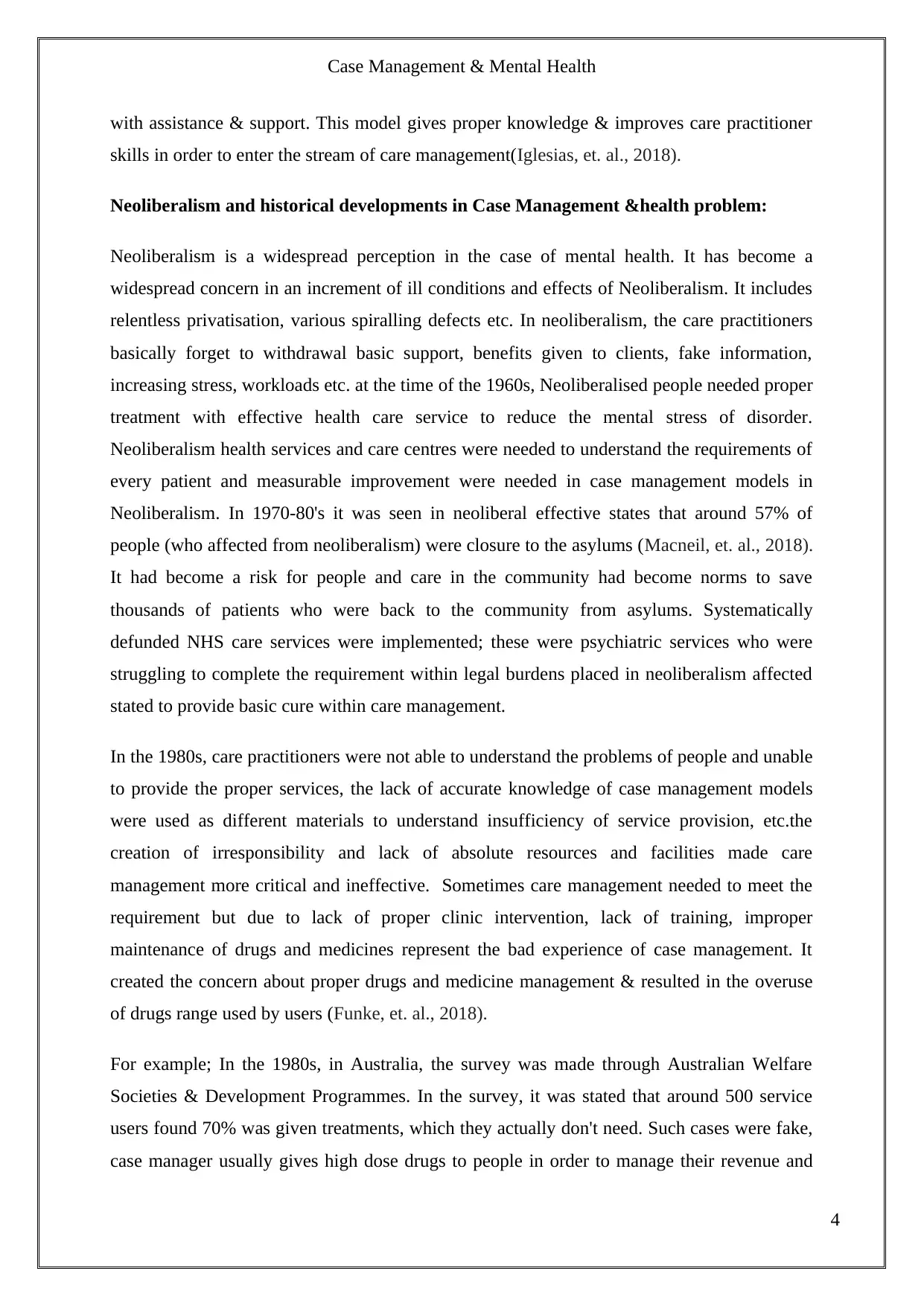
Case Management & Mental Health
with assistance & support. This model gives proper knowledge & improves care practitioner
skills in order to enter the stream of care management(Iglesias, et. al., 2018).
Neoliberalism and historical developments in Case Management &health problem:
Neoliberalism is a widespread perception in the case of mental health. It has become a
widespread concern in an increment of ill conditions and effects of Neoliberalism. It includes
relentless privatisation, various spiralling defects etc. In neoliberalism, the care practitioners
basically forget to withdrawal basic support, benefits given to clients, fake information,
increasing stress, workloads etc. at the time of the 1960s, Neoliberalised people needed proper
treatment with effective health care service to reduce the mental stress of disorder.
Neoliberalism health services and care centres were needed to understand the requirements of
every patient and measurable improvement were needed in case management models in
Neoliberalism. In 1970-80's it was seen in neoliberal effective states that around 57% of
people (who affected from neoliberalism) were closure to the asylums (Macneil, et. al., 2018).
It had become a risk for people and care in the community had become norms to save
thousands of patients who were back to the community from asylums. Systematically
defunded NHS care services were implemented; these were psychiatric services who were
struggling to complete the requirement within legal burdens placed in neoliberalism affected
stated to provide basic cure within care management.
In the 1980s, care practitioners were not able to understand the problems of people and unable
to provide the proper services, the lack of accurate knowledge of case management models
were used as different materials to understand insufficiency of service provision, etc.the
creation of irresponsibility and lack of absolute resources and facilities made care
management more critical and ineffective. Sometimes care management needed to meet the
requirement but due to lack of proper clinic intervention, lack of training, improper
maintenance of drugs and medicines represent the bad experience of case management. It
created the concern about proper drugs and medicine management & resulted in the overuse
of drugs range used by users (Funke, et. al., 2018).
For example; In the 1980s, in Australia, the survey was made through Australian Welfare
Societies & Development Programmes. In the survey, it was stated that around 500 service
users found 70% was given treatments, which they actually don't need. Such cases were fake,
case manager usually gives high dose drugs to people in order to manage their revenue and
4
with assistance & support. This model gives proper knowledge & improves care practitioner
skills in order to enter the stream of care management(Iglesias, et. al., 2018).
Neoliberalism and historical developments in Case Management &health problem:
Neoliberalism is a widespread perception in the case of mental health. It has become a
widespread concern in an increment of ill conditions and effects of Neoliberalism. It includes
relentless privatisation, various spiralling defects etc. In neoliberalism, the care practitioners
basically forget to withdrawal basic support, benefits given to clients, fake information,
increasing stress, workloads etc. at the time of the 1960s, Neoliberalised people needed proper
treatment with effective health care service to reduce the mental stress of disorder.
Neoliberalism health services and care centres were needed to understand the requirements of
every patient and measurable improvement were needed in case management models in
Neoliberalism. In 1970-80's it was seen in neoliberal effective states that around 57% of
people (who affected from neoliberalism) were closure to the asylums (Macneil, et. al., 2018).
It had become a risk for people and care in the community had become norms to save
thousands of patients who were back to the community from asylums. Systematically
defunded NHS care services were implemented; these were psychiatric services who were
struggling to complete the requirement within legal burdens placed in neoliberalism affected
stated to provide basic cure within care management.
In the 1980s, care practitioners were not able to understand the problems of people and unable
to provide the proper services, the lack of accurate knowledge of case management models
were used as different materials to understand insufficiency of service provision, etc.the
creation of irresponsibility and lack of absolute resources and facilities made care
management more critical and ineffective. Sometimes care management needed to meet the
requirement but due to lack of proper clinic intervention, lack of training, improper
maintenance of drugs and medicines represent the bad experience of case management. It
created the concern about proper drugs and medicine management & resulted in the overuse
of drugs range used by users (Funke, et. al., 2018).
For example; In the 1980s, in Australia, the survey was made through Australian Welfare
Societies & Development Programmes. In the survey, it was stated that around 500 service
users found 70% was given treatments, which they actually don't need. Such cases were fake,
case manager usually gives high dose drugs to people in order to manage their revenue and
4
Paraphrase This Document
Need a fresh take? Get an instant paraphrase of this document with our AI Paraphraser
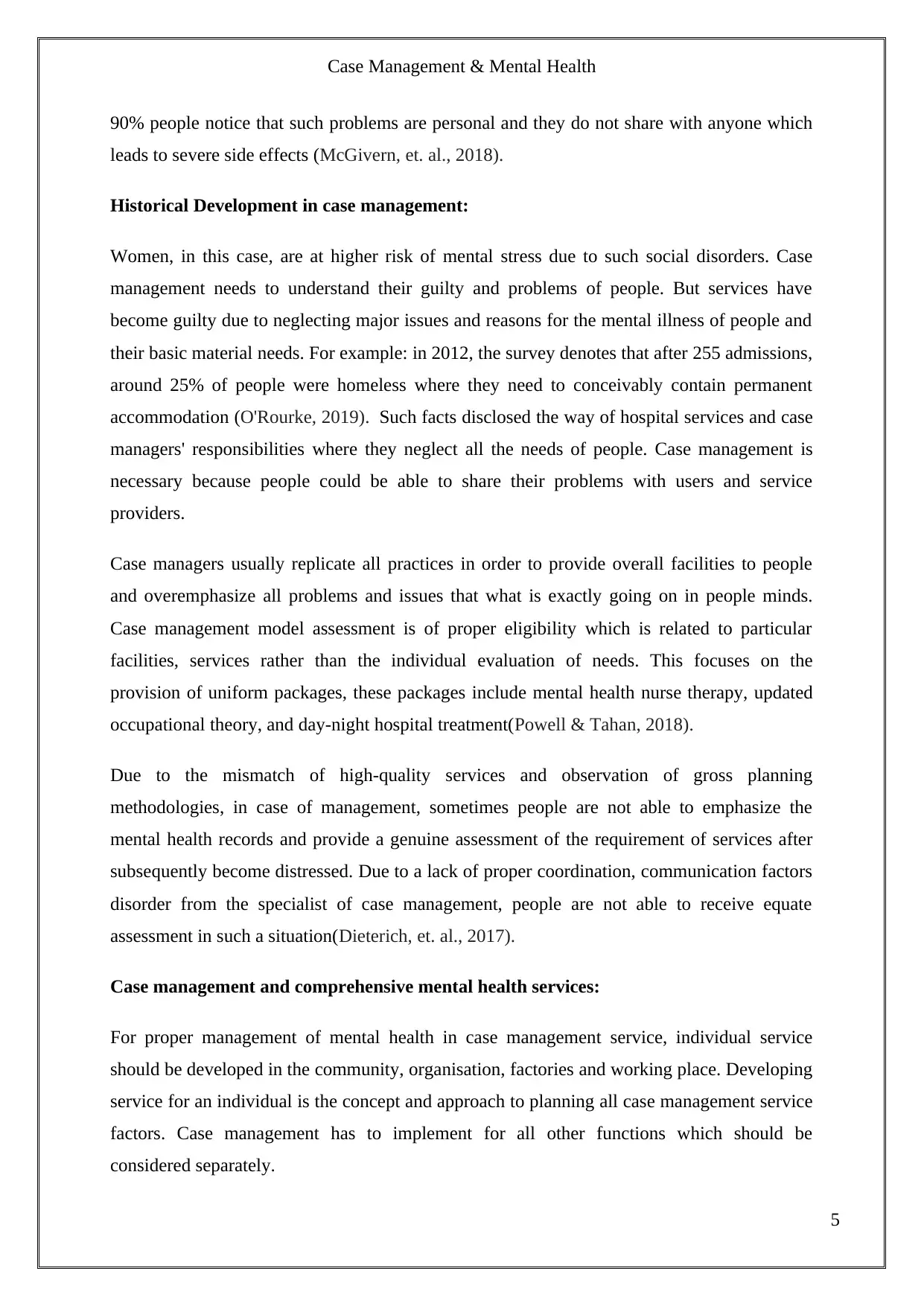
Case Management & Mental Health
90% people notice that such problems are personal and they do not share with anyone which
leads to severe side effects (McGivern, et. al., 2018).
Historical Development in case management:
Women, in this case, are at higher risk of mental stress due to such social disorders. Case
management needs to understand their guilty and problems of people. But services have
become guilty due to neglecting major issues and reasons for the mental illness of people and
their basic material needs. For example: in 2012, the survey denotes that after 255 admissions,
around 25% of people were homeless where they need to conceivably contain permanent
accommodation (O'Rourke, 2019). Such facts disclosed the way of hospital services and case
managers' responsibilities where they neglect all the needs of people. Case management is
necessary because people could be able to share their problems with users and service
providers.
Case managers usually replicate all practices in order to provide overall facilities to people
and overemphasize all problems and issues that what is exactly going on in people minds.
Case management model assessment is of proper eligibility which is related to particular
facilities, services rather than the individual evaluation of needs. This focuses on the
provision of uniform packages, these packages include mental health nurse therapy, updated
occupational theory, and day-night hospital treatment(Powell & Tahan, 2018).
Due to the mismatch of high-quality services and observation of gross planning
methodologies, in case of management, sometimes people are not able to emphasize the
mental health records and provide a genuine assessment of the requirement of services after
subsequently become distressed. Due to a lack of proper coordination, communication factors
disorder from the specialist of case management, people are not able to receive equate
assessment in such a situation(Dieterich, et. al., 2017).
Case management and comprehensive mental health services:
For proper management of mental health in case management service, individual service
should be developed in the community, organisation, factories and working place. Developing
service for an individual is the concept and approach to planning all case management service
factors. Case management has to implement for all other functions which should be
considered separately.
5
90% people notice that such problems are personal and they do not share with anyone which
leads to severe side effects (McGivern, et. al., 2018).
Historical Development in case management:
Women, in this case, are at higher risk of mental stress due to such social disorders. Case
management needs to understand their guilty and problems of people. But services have
become guilty due to neglecting major issues and reasons for the mental illness of people and
their basic material needs. For example: in 2012, the survey denotes that after 255 admissions,
around 25% of people were homeless where they need to conceivably contain permanent
accommodation (O'Rourke, 2019). Such facts disclosed the way of hospital services and case
managers' responsibilities where they neglect all the needs of people. Case management is
necessary because people could be able to share their problems with users and service
providers.
Case managers usually replicate all practices in order to provide overall facilities to people
and overemphasize all problems and issues that what is exactly going on in people minds.
Case management model assessment is of proper eligibility which is related to particular
facilities, services rather than the individual evaluation of needs. This focuses on the
provision of uniform packages, these packages include mental health nurse therapy, updated
occupational theory, and day-night hospital treatment(Powell & Tahan, 2018).
Due to the mismatch of high-quality services and observation of gross planning
methodologies, in case of management, sometimes people are not able to emphasize the
mental health records and provide a genuine assessment of the requirement of services after
subsequently become distressed. Due to a lack of proper coordination, communication factors
disorder from the specialist of case management, people are not able to receive equate
assessment in such a situation(Dieterich, et. al., 2017).
Case management and comprehensive mental health services:
For proper management of mental health in case management service, individual service
should be developed in the community, organisation, factories and working place. Developing
service for an individual is the concept and approach to planning all case management service
factors. Case management has to implement for all other functions which should be
considered separately.
5
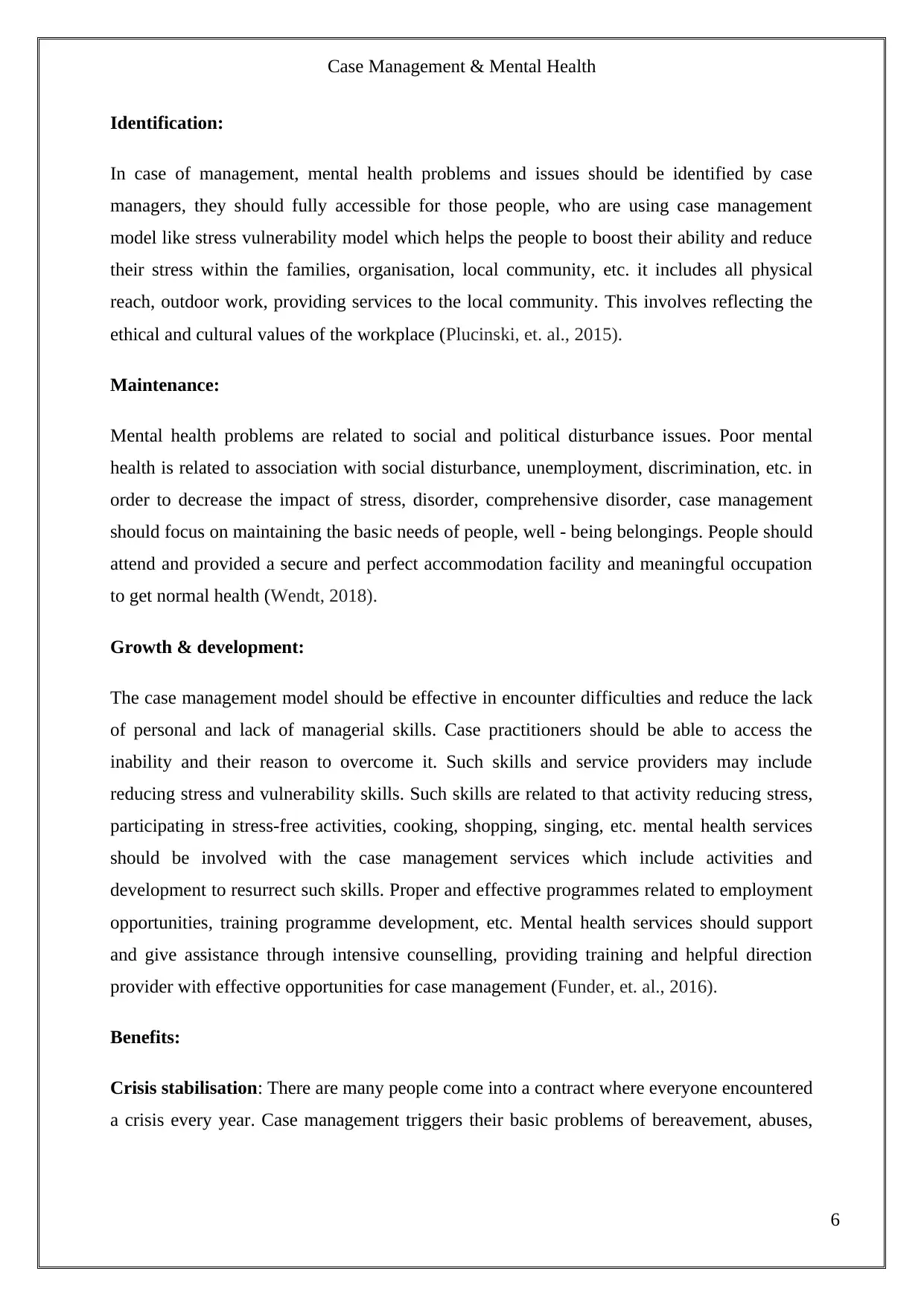
Case Management & Mental Health
Identification:
In case of management, mental health problems and issues should be identified by case
managers, they should fully accessible for those people, who are using case management
model like stress vulnerability model which helps the people to boost their ability and reduce
their stress within the families, organisation, local community, etc. it includes all physical
reach, outdoor work, providing services to the local community. This involves reflecting the
ethical and cultural values of the workplace (Plucinski, et. al., 2015).
Maintenance:
Mental health problems are related to social and political disturbance issues. Poor mental
health is related to association with social disturbance, unemployment, discrimination, etc. in
order to decrease the impact of stress, disorder, comprehensive disorder, case management
should focus on maintaining the basic needs of people, well - being belongings. People should
attend and provided a secure and perfect accommodation facility and meaningful occupation
to get normal health (Wendt, 2018).
Growth & development:
The case management model should be effective in encounter difficulties and reduce the lack
of personal and lack of managerial skills. Case practitioners should be able to access the
inability and their reason to overcome it. Such skills and service providers may include
reducing stress and vulnerability skills. Such skills are related to that activity reducing stress,
participating in stress-free activities, cooking, shopping, singing, etc. mental health services
should be involved with the case management services which include activities and
development to resurrect such skills. Proper and effective programmes related to employment
opportunities, training programme development, etc. Mental health services should support
and give assistance through intensive counselling, providing training and helpful direction
provider with effective opportunities for case management (Funder, et. al., 2016).
Benefits:
Crisis stabilisation: There are many people come into a contract where everyone encountered
a crisis every year. Case management triggers their basic problems of bereavement, abuses,
6
Identification:
In case of management, mental health problems and issues should be identified by case
managers, they should fully accessible for those people, who are using case management
model like stress vulnerability model which helps the people to boost their ability and reduce
their stress within the families, organisation, local community, etc. it includes all physical
reach, outdoor work, providing services to the local community. This involves reflecting the
ethical and cultural values of the workplace (Plucinski, et. al., 2015).
Maintenance:
Mental health problems are related to social and political disturbance issues. Poor mental
health is related to association with social disturbance, unemployment, discrimination, etc. in
order to decrease the impact of stress, disorder, comprehensive disorder, case management
should focus on maintaining the basic needs of people, well - being belongings. People should
attend and provided a secure and perfect accommodation facility and meaningful occupation
to get normal health (Wendt, 2018).
Growth & development:
The case management model should be effective in encounter difficulties and reduce the lack
of personal and lack of managerial skills. Case practitioners should be able to access the
inability and their reason to overcome it. Such skills and service providers may include
reducing stress and vulnerability skills. Such skills are related to that activity reducing stress,
participating in stress-free activities, cooking, shopping, singing, etc. mental health services
should be involved with the case management services which include activities and
development to resurrect such skills. Proper and effective programmes related to employment
opportunities, training programme development, etc. Mental health services should support
and give assistance through intensive counselling, providing training and helpful direction
provider with effective opportunities for case management (Funder, et. al., 2016).
Benefits:
Crisis stabilisation: There are many people come into a contract where everyone encountered
a crisis every year. Case management triggers their basic problems of bereavement, abuses,
6
⊘ This is a preview!⊘
Do you want full access?
Subscribe today to unlock all pages.

Trusted by 1+ million students worldwide
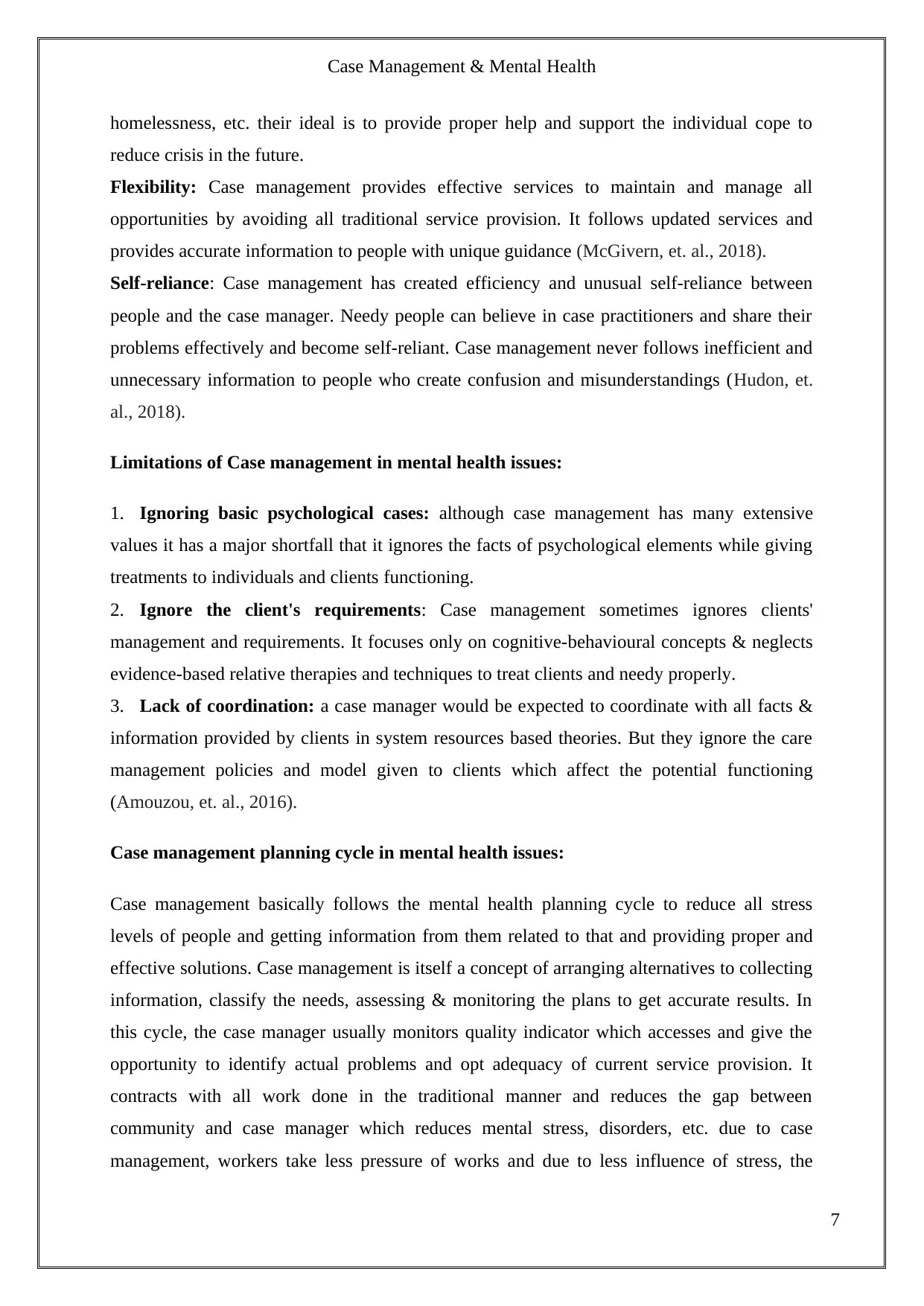
Case Management & Mental Health
homelessness, etc. their ideal is to provide proper help and support the individual cope to
reduce crisis in the future.
Flexibility: Case management provides effective services to maintain and manage all
opportunities by avoiding all traditional service provision. It follows updated services and
provides accurate information to people with unique guidance (McGivern, et. al., 2018).
Self-reliance: Case management has created efficiency and unusual self-reliance between
people and the case manager. Needy people can believe in case practitioners and share their
problems effectively and become self-reliant. Case management never follows inefficient and
unnecessary information to people who create confusion and misunderstandings (Hudon, et.
al., 2018).
Limitations of Case management in mental health issues:
1. Ignoring basic psychological cases: although case management has many extensive
values it has a major shortfall that it ignores the facts of psychological elements while giving
treatments to individuals and clients functioning.
2. Ignore the client's requirements: Case management sometimes ignores clients'
management and requirements. It focuses only on cognitive-behavioural concepts & neglects
evidence-based relative therapies and techniques to treat clients and needy properly.
3. Lack of coordination: a case manager would be expected to coordinate with all facts &
information provided by clients in system resources based theories. But they ignore the care
management policies and model given to clients which affect the potential functioning
(Amouzou, et. al., 2016).
Case management planning cycle in mental health issues:
Case management basically follows the mental health planning cycle to reduce all stress
levels of people and getting information from them related to that and providing proper and
effective solutions. Case management is itself a concept of arranging alternatives to collecting
information, classify the needs, assessing & monitoring the plans to get accurate results. In
this cycle, the case manager usually monitors quality indicator which accesses and give the
opportunity to identify actual problems and opt adequacy of current service provision. It
contracts with all work done in the traditional manner and reduces the gap between
community and case manager which reduces mental stress, disorders, etc. due to case
management, workers take less pressure of works and due to less influence of stress, the
7
homelessness, etc. their ideal is to provide proper help and support the individual cope to
reduce crisis in the future.
Flexibility: Case management provides effective services to maintain and manage all
opportunities by avoiding all traditional service provision. It follows updated services and
provides accurate information to people with unique guidance (McGivern, et. al., 2018).
Self-reliance: Case management has created efficiency and unusual self-reliance between
people and the case manager. Needy people can believe in case practitioners and share their
problems effectively and become self-reliant. Case management never follows inefficient and
unnecessary information to people who create confusion and misunderstandings (Hudon, et.
al., 2018).
Limitations of Case management in mental health issues:
1. Ignoring basic psychological cases: although case management has many extensive
values it has a major shortfall that it ignores the facts of psychological elements while giving
treatments to individuals and clients functioning.
2. Ignore the client's requirements: Case management sometimes ignores clients'
management and requirements. It focuses only on cognitive-behavioural concepts & neglects
evidence-based relative therapies and techniques to treat clients and needy properly.
3. Lack of coordination: a case manager would be expected to coordinate with all facts &
information provided by clients in system resources based theories. But they ignore the care
management policies and model given to clients which affect the potential functioning
(Amouzou, et. al., 2016).
Case management planning cycle in mental health issues:
Case management basically follows the mental health planning cycle to reduce all stress
levels of people and getting information from them related to that and providing proper and
effective solutions. Case management is itself a concept of arranging alternatives to collecting
information, classify the needs, assessing & monitoring the plans to get accurate results. In
this cycle, the case manager usually monitors quality indicator which accesses and give the
opportunity to identify actual problems and opt adequacy of current service provision. It
contracts with all work done in the traditional manner and reduces the gap between
community and case manager which reduces mental stress, disorders, etc. due to case
management, workers take less pressure of works and due to less influence of stress, the
7
Paraphrase This Document
Need a fresh take? Get an instant paraphrase of this document with our AI Paraphraser
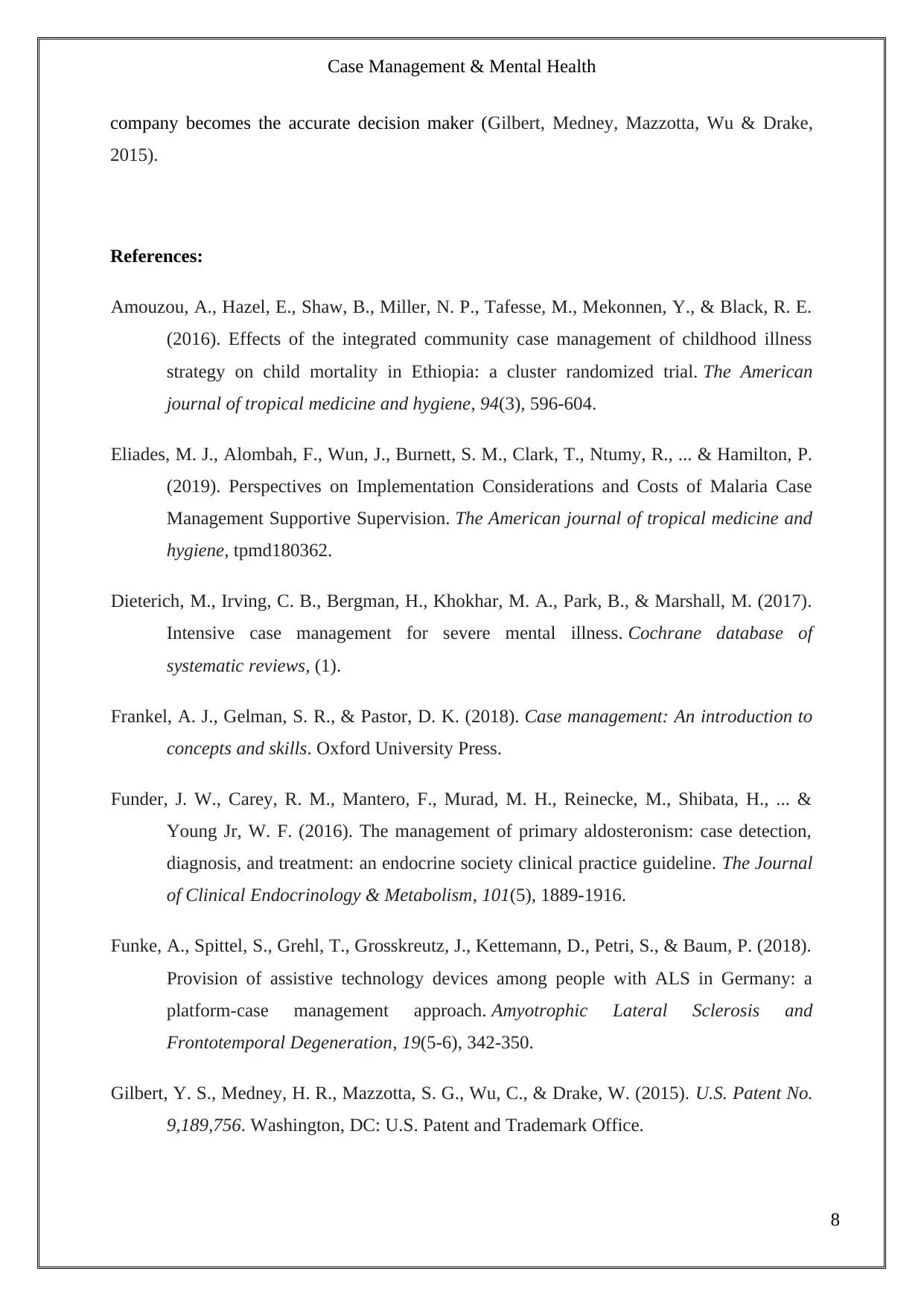
Case Management & Mental Health
company becomes the accurate decision maker (Gilbert, Medney, Mazzotta, Wu & Drake,
2015).
References:
Amouzou, A., Hazel, E., Shaw, B., Miller, N. P., Tafesse, M., Mekonnen, Y., & Black, R. E.
(2016). Effects of the integrated community case management of childhood illness
strategy on child mortality in Ethiopia: a cluster randomized trial. The American
journal of tropical medicine and hygiene, 94(3), 596-604.
Eliades, M. J., Alombah, F., Wun, J., Burnett, S. M., Clark, T., Ntumy, R., ... & Hamilton, P.
(2019). Perspectives on Implementation Considerations and Costs of Malaria Case
Management Supportive Supervision. The American journal of tropical medicine and
hygiene, tpmd180362.
Dieterich, M., Irving, C. B., Bergman, H., Khokhar, M. A., Park, B., & Marshall, M. (2017).
Intensive case management for severe mental illness. Cochrane database of
systematic reviews, (1).
Frankel, A. J., Gelman, S. R., & Pastor, D. K. (2018). Case management: An introduction to
concepts and skills. Oxford University Press.
Funder, J. W., Carey, R. M., Mantero, F., Murad, M. H., Reinecke, M., Shibata, H., ... &
Young Jr, W. F. (2016). The management of primary aldosteronism: case detection,
diagnosis, and treatment: an endocrine society clinical practice guideline. The Journal
of Clinical Endocrinology & Metabolism, 101(5), 1889-1916.
Funke, A., Spittel, S., Grehl, T., Grosskreutz, J., Kettemann, D., Petri, S., & Baum, P. (2018).
Provision of assistive technology devices among people with ALS in Germany: a
platform-case management approach. Amyotrophic Lateral Sclerosis and
Frontotemporal Degeneration, 19(5-6), 342-350.
Gilbert, Y. S., Medney, H. R., Mazzotta, S. G., Wu, C., & Drake, W. (2015). U.S. Patent No.
9,189,756. Washington, DC: U.S. Patent and Trademark Office.
8
company becomes the accurate decision maker (Gilbert, Medney, Mazzotta, Wu & Drake,
2015).
References:
Amouzou, A., Hazel, E., Shaw, B., Miller, N. P., Tafesse, M., Mekonnen, Y., & Black, R. E.
(2016). Effects of the integrated community case management of childhood illness
strategy on child mortality in Ethiopia: a cluster randomized trial. The American
journal of tropical medicine and hygiene, 94(3), 596-604.
Eliades, M. J., Alombah, F., Wun, J., Burnett, S. M., Clark, T., Ntumy, R., ... & Hamilton, P.
(2019). Perspectives on Implementation Considerations and Costs of Malaria Case
Management Supportive Supervision. The American journal of tropical medicine and
hygiene, tpmd180362.
Dieterich, M., Irving, C. B., Bergman, H., Khokhar, M. A., Park, B., & Marshall, M. (2017).
Intensive case management for severe mental illness. Cochrane database of
systematic reviews, (1).
Frankel, A. J., Gelman, S. R., & Pastor, D. K. (2018). Case management: An introduction to
concepts and skills. Oxford University Press.
Funder, J. W., Carey, R. M., Mantero, F., Murad, M. H., Reinecke, M., Shibata, H., ... &
Young Jr, W. F. (2016). The management of primary aldosteronism: case detection,
diagnosis, and treatment: an endocrine society clinical practice guideline. The Journal
of Clinical Endocrinology & Metabolism, 101(5), 1889-1916.
Funke, A., Spittel, S., Grehl, T., Grosskreutz, J., Kettemann, D., Petri, S., & Baum, P. (2018).
Provision of assistive technology devices among people with ALS in Germany: a
platform-case management approach. Amyotrophic Lateral Sclerosis and
Frontotemporal Degeneration, 19(5-6), 342-350.
Gilbert, Y. S., Medney, H. R., Mazzotta, S. G., Wu, C., & Drake, W. (2015). U.S. Patent No.
9,189,756. Washington, DC: U.S. Patent and Trademark Office.
8
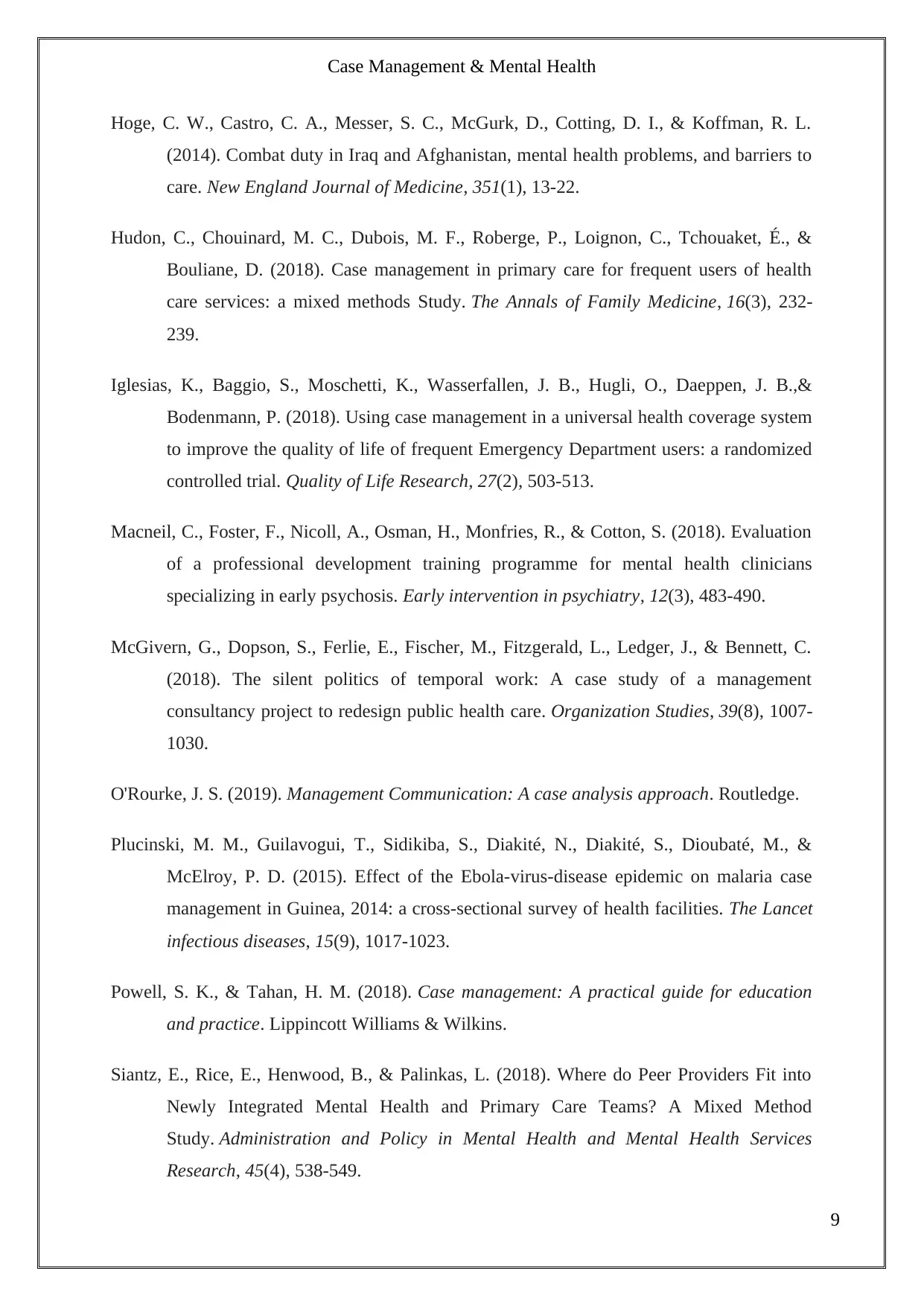
Case Management & Mental Health
Hoge, C. W., Castro, C. A., Messer, S. C., McGurk, D., Cotting, D. I., & Koffman, R. L.
(2014). Combat duty in Iraq and Afghanistan, mental health problems, and barriers to
care. New England Journal of Medicine, 351(1), 13-22.
Hudon, C., Chouinard, M. C., Dubois, M. F., Roberge, P., Loignon, C., Tchouaket, É., &
Bouliane, D. (2018). Case management in primary care for frequent users of health
care services: a mixed methods Study. The Annals of Family Medicine, 16(3), 232-
239.
Iglesias, K., Baggio, S., Moschetti, K., Wasserfallen, J. B., Hugli, O., Daeppen, J. B.,&
Bodenmann, P. (2018). Using case management in a universal health coverage system
to improve the quality of life of frequent Emergency Department users: a randomized
controlled trial. Quality of Life Research, 27(2), 503-513.
Macneil, C., Foster, F., Nicoll, A., Osman, H., Monfries, R., & Cotton, S. (2018). Evaluation
of a professional development training programme for mental health clinicians
specializing in early psychosis. Early intervention in psychiatry, 12(3), 483-490.
McGivern, G., Dopson, S., Ferlie, E., Fischer, M., Fitzgerald, L., Ledger, J., & Bennett, C.
(2018). The silent politics of temporal work: A case study of a management
consultancy project to redesign public health care. Organization Studies, 39(8), 1007-
1030.
O'Rourke, J. S. (2019). Management Communication: A case analysis approach. Routledge.
Plucinski, M. M., Guilavogui, T., Sidikiba, S., Diakité, N., Diakité, S., Dioubaté, M., &
McElroy, P. D. (2015). Effect of the Ebola-virus-disease epidemic on malaria case
management in Guinea, 2014: a cross-sectional survey of health facilities. The Lancet
infectious diseases, 15(9), 1017-1023.
Powell, S. K., & Tahan, H. M. (2018). Case management: A practical guide for education
and practice. Lippincott Williams & Wilkins.
Siantz, E., Rice, E., Henwood, B., & Palinkas, L. (2018). Where do Peer Providers Fit into
Newly Integrated Mental Health and Primary Care Teams? A Mixed Method
Study. Administration and Policy in Mental Health and Mental Health Services
Research, 45(4), 538-549.
9
Hoge, C. W., Castro, C. A., Messer, S. C., McGurk, D., Cotting, D. I., & Koffman, R. L.
(2014). Combat duty in Iraq and Afghanistan, mental health problems, and barriers to
care. New England Journal of Medicine, 351(1), 13-22.
Hudon, C., Chouinard, M. C., Dubois, M. F., Roberge, P., Loignon, C., Tchouaket, É., &
Bouliane, D. (2018). Case management in primary care for frequent users of health
care services: a mixed methods Study. The Annals of Family Medicine, 16(3), 232-
239.
Iglesias, K., Baggio, S., Moschetti, K., Wasserfallen, J. B., Hugli, O., Daeppen, J. B.,&
Bodenmann, P. (2018). Using case management in a universal health coverage system
to improve the quality of life of frequent Emergency Department users: a randomized
controlled trial. Quality of Life Research, 27(2), 503-513.
Macneil, C., Foster, F., Nicoll, A., Osman, H., Monfries, R., & Cotton, S. (2018). Evaluation
of a professional development training programme for mental health clinicians
specializing in early psychosis. Early intervention in psychiatry, 12(3), 483-490.
McGivern, G., Dopson, S., Ferlie, E., Fischer, M., Fitzgerald, L., Ledger, J., & Bennett, C.
(2018). The silent politics of temporal work: A case study of a management
consultancy project to redesign public health care. Organization Studies, 39(8), 1007-
1030.
O'Rourke, J. S. (2019). Management Communication: A case analysis approach. Routledge.
Plucinski, M. M., Guilavogui, T., Sidikiba, S., Diakité, N., Diakité, S., Dioubaté, M., &
McElroy, P. D. (2015). Effect of the Ebola-virus-disease epidemic on malaria case
management in Guinea, 2014: a cross-sectional survey of health facilities. The Lancet
infectious diseases, 15(9), 1017-1023.
Powell, S. K., & Tahan, H. M. (2018). Case management: A practical guide for education
and practice. Lippincott Williams & Wilkins.
Siantz, E., Rice, E., Henwood, B., & Palinkas, L. (2018). Where do Peer Providers Fit into
Newly Integrated Mental Health and Primary Care Teams? A Mixed Method
Study. Administration and Policy in Mental Health and Mental Health Services
Research, 45(4), 538-549.
9
⊘ This is a preview!⊘
Do you want full access?
Subscribe today to unlock all pages.

Trusted by 1+ million students worldwide
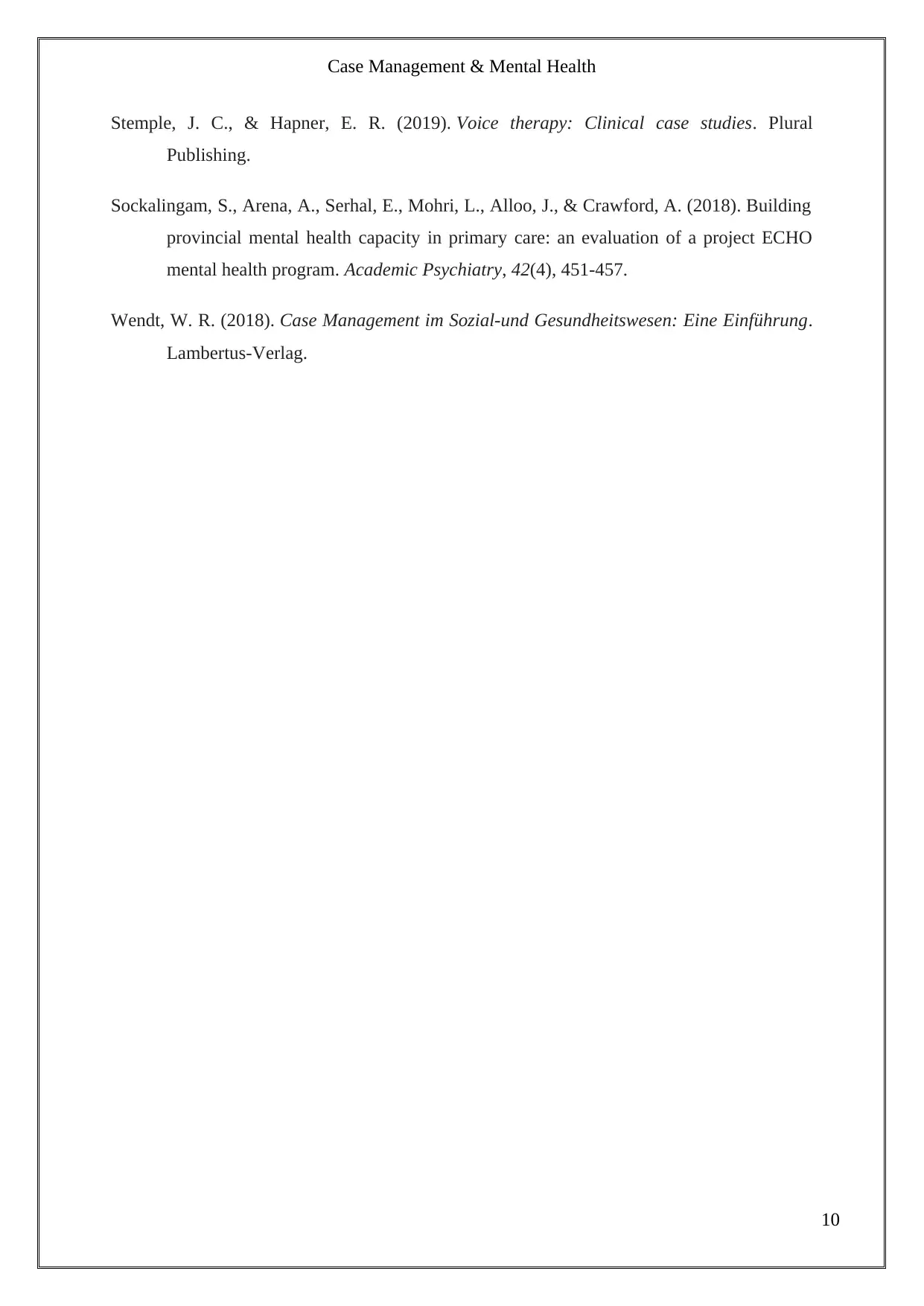
Case Management & Mental Health
Stemple, J. C., & Hapner, E. R. (2019). Voice therapy: Clinical case studies. Plural
Publishing.
Sockalingam, S., Arena, A., Serhal, E., Mohri, L., Alloo, J., & Crawford, A. (2018). Building
provincial mental health capacity in primary care: an evaluation of a project ECHO
mental health program. Academic Psychiatry, 42(4), 451-457.
Wendt, W. R. (2018). Case Management im Sozial-und Gesundheitswesen: Eine Einführung.
Lambertus-Verlag.
10
Stemple, J. C., & Hapner, E. R. (2019). Voice therapy: Clinical case studies. Plural
Publishing.
Sockalingam, S., Arena, A., Serhal, E., Mohri, L., Alloo, J., & Crawford, A. (2018). Building
provincial mental health capacity in primary care: an evaluation of a project ECHO
mental health program. Academic Psychiatry, 42(4), 451-457.
Wendt, W. R. (2018). Case Management im Sozial-und Gesundheitswesen: Eine Einführung.
Lambertus-Verlag.
10
1 out of 10
Related Documents
Your All-in-One AI-Powered Toolkit for Academic Success.
+13062052269
info@desklib.com
Available 24*7 on WhatsApp / Email
![[object Object]](/_next/static/media/star-bottom.7253800d.svg)
Unlock your academic potential
Copyright © 2020–2026 A2Z Services. All Rights Reserved. Developed and managed by ZUCOL.





